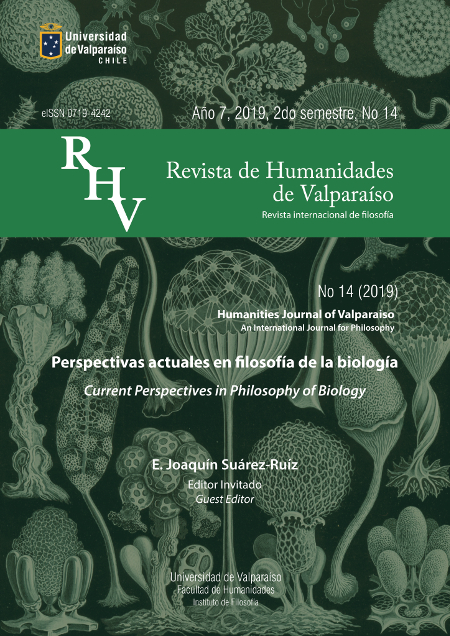Sobre la legitimidad de la interrogación meta-filosófica en filosofía de la biología
DOI:
https://doi.org/10.22370/rhv2019iss14pp377-393Palabras clave:
philosophy of biology, philosophical naturalism, meta-philosophy, anthropocentrismResumen
Una de las líneas de investigación más polémicas y actualmente desarrolladas en filosofía de la biología es aquella en la que los/las filósofos/as examinan los supuestos pre-darwinianos que aún estarían presentes en la base de otras sub-disciplinas filosóficas, como ser la ética, la gnoseología, la filosofía del lenguaje, etc. Este tipo de indagación, que aquí denominaré “interrogación meta-filosófica”, puede pensarse como un abordaje complementario al epistemológico, el cual permite ampliar el enfoque crítico de la disciplina en cuestión. El objetivo de este artículo será explicitar las características de la “interrogación meta-filosófica” y argumentar sobre su legitimidad en tanto un modo de análisis propio de la Filosofía de la biología.
Descargas
Citas
Andler, D. (2016). La silhouette de l’humain. Quelle place pour le naturalisme dans le monde d’aujourd’hui? Paris: Gallimard.
Baumard, N. (2016). The origins of fairness, how evolution explains our moral nature. Oxford: Oxford University Press.
Blackburn, S. (2005). The oxford dictionary of philosophy. Oxford: Oxford University Press.
Boddice, R. (ed.) (2011). Humans, animals, environments. Leiden: Brill.
Brand, C. (ed.) (2016). Dual-process theories in moral psychology. Wiesbaden: Springer.
Butcharov, P. (2015). Anthropocentrism in philosophy. Berlin: De Gruyter.
Caponi, G. (2018). ¿Qué quiere decir “naturalizar”? Ludus Vitalis, XXVI(50): 185-188.
Damasio, A. (1994). Descartes’ error: emotion, reason, and the human brain. New York: Putnam.
Dennett, D. (2004). La evolución de la libertad. Barcelona: Paidos.
Dewey, J. (1911). The influence of Darwin on Philosophy. The Philosophical Review, 20(2): 219-221.
Diéguez, A. (2014a). Delimitación y defensa del naturalismo metodológico (en la ciencia y en la filosofía). En R. Gutierrez-Lombardo, J. Sanmartín (eds.), La filosofía desde la ciencia, pp.21-49. México DF: Centro de Estudios Filosóficos, Políticos y Sociales Vicente Lombardo Toledano.
Diéguez, A. (2014b). Pensamiento conceptual en animales. En A. Diéguez, J. M. Atencia, Naturaleza animal y humana, pp. 83-114. Madrid: Biblioteca nueva.
Diéguez, A., Atencia, J. M. (2014). Naturaleza animal y humana. Madrid: Biblioteca nueva.
Gould, J. L. (2002). Learning instincts. En J. Wixted, H. Pashler (eds.), Steven’s handbook of experimental psychology: Learning, motivation, and emotion, pp. 239-257. New Jersey: John Wiley & Sons. doi: https://doi.org/10.1002/0471214426.pas0306
Greene, J. (2013). Moral tribes. Nueva York: The Penguin Press.
Haidt, J. (2001). The emotional dog and its rational tail: a social intuitionist approach to moral judgment. Psychological Review, 108: 814-834.
Ingmanson, E. (1996). Tool-using behavior in Wild Pan Paniscus: Social and Ecological Considerations. En A. Russon et al. (eds.), Reaching into Thought: The Minds of the Great Apes, pp. 190-210. Nueva York : Cambridge University Press.
Kitcher, P. (2011). The ethical Project. Cambridge: Harvard University Press.
Lepore, E., Ludwig, K. (eds.) (2013). A companion to Donald Davidson. Oxford: Wiley-Blackwell.
McGrew, W. (1998). Culture in nonhuman primates? Annual Review of Anthropology, 27: 301-28.
Popp, J. (2007). Evolution’s first philosopher, John Dewey and the continuity of nature. Nueva York: State University of New York Press.
Ruse, M. (2005). Altruismo: una perspectiva naturalista darwiniana. Saga, 10: 95-110. Traducción: Maximiliano Martínez y Fernando Melo. El texto original puede hallarse en S. Post, et al. (eds.) (2002), Altruism and altruistic love. Oxford: Oxford University Press.
Schaeffer, J. M. (2009). El fin de la excepción humana. Barcelona: Marbot.
Sapolsky, R. (2017). Behave: the biology of humans at our best and worst. Nueva York: Penguin.
Sapolsky, R., Share, L. (2004). A pacific culture among wild baboons, its emergence and transmission. Public Library of Science Biology, 2: e106-13.
Singer, P. (2009). Liberación Animal. Madrid: Trotta.
Sterelny, K. (2006). Folk logic and animal rationality. En S. Hurley, M. Nudds (eds.), Rational Animals? pp. 293-311. Oxford: Oxford University Press.
Suárez-Ruíz, E. J. (2017). Filosofía post-darwiniana: sobre la relevancia de la continuidad evolutiva en la comprensión de la moral. Tesis de licenciatura, Dpto. de Filosofía, FaHCE, UNLP.
Suárez-Ruíz, E. J. (2018). Para una caracterización filosófica de la continuidad evolutiva. Revista Latinoamericana de Estudios Críticos Animales, 2: 139-158.
Suárez-Ruíz, E. J. (2019). El otro lado de la filosofía de la biología: una problematización de lo epistemológico como límite disciplinar. Nuevo Itinerario, 15: 58-74.
Toda, K., Platt, M. L. (2015). Animal cognition: monkeys pass the mirror test. Current biology, 25(12): 64-66.
Tomasello, M. (2000). Primate cognition: introduction to the issue. Cognitive science, 24(3): 351-361.
Toribio, J. (2010). The animal concepts debate: a metaphilosophical take. Teorema, XXIX(2): 11-24.
Tonutti, S. (2011). Anthropocentrism and the Definition of ‘Culture’ as a Marker of the Human/Animal Divide. R. Boddice (ed.), Humans, Animals, Environments, pp.183-199. Leiden: Brill.
Volokh, E. (2003). The mechanisms of the slipperly slope. Harvard Law Review, 116(4): 1026-1137.
Waal, F. de (1991). The chimpanzee’s sense of social regularity and its relation to the human sense of justice. American Behavioral Scientist, 34: 335-349.
Waal, F. de (2007). Primates y filósofos. Barcelona: Paidos.
Descargas
Publicado
Cómo citar
Número
Sección
Licencia
Aquellos autores/as que tengan publicaciones con esta revista, aceptan los términos siguientes:
- Los autores/as conservarán sus derechos de autor y garantizarán a la revista el derecho de primera publicación de su obra, el cual estará simultáneamente sujeto a la Licencia de reconocimiento de Creative Commons (CC BY-NC-ND 4.0 International) que permite a terceros compartir la obra siempre que se indique su autor y su primera publicación esta revista.
- Los autores/as podrán adoptar otros acuerdos de licencia no exclusiva de distribución de la versión de la obra publicada (p. ej.: depositarla en un archivo telemático institucional o publicarla en un volumen monográfico) siempre que se indique la publicación inicial en esta revista.
- Se permite y recomienda a los autores/as difundir su obra a través de Internet (p. ej.: en archivos telemáticos institucionales o en su página web) antes y durante el proceso de envío, lo cual puede producir intercambios interesantes y aumentar las citas de la obra publicada. (Véase El efecto del acceso abierto).






